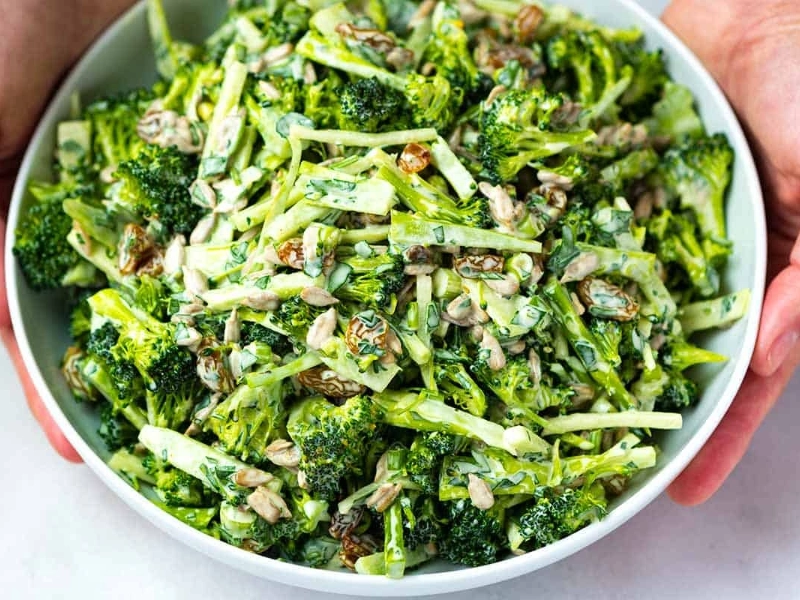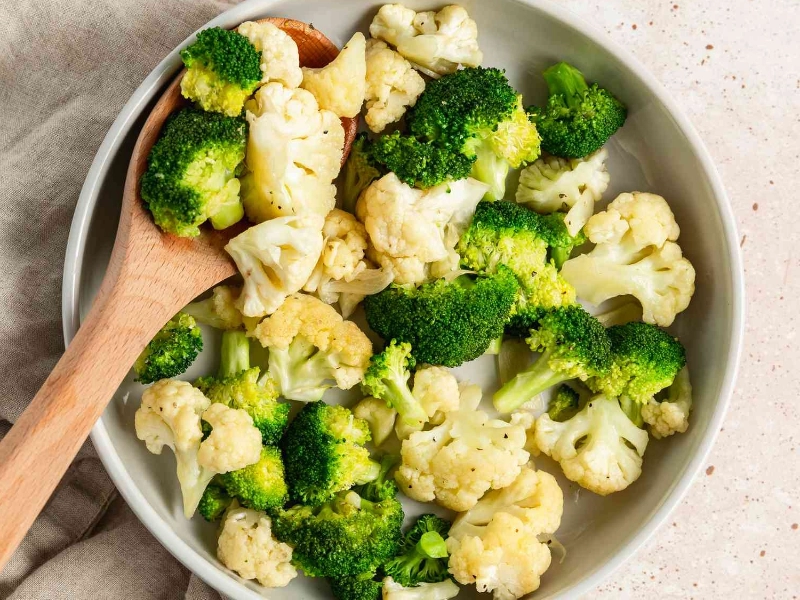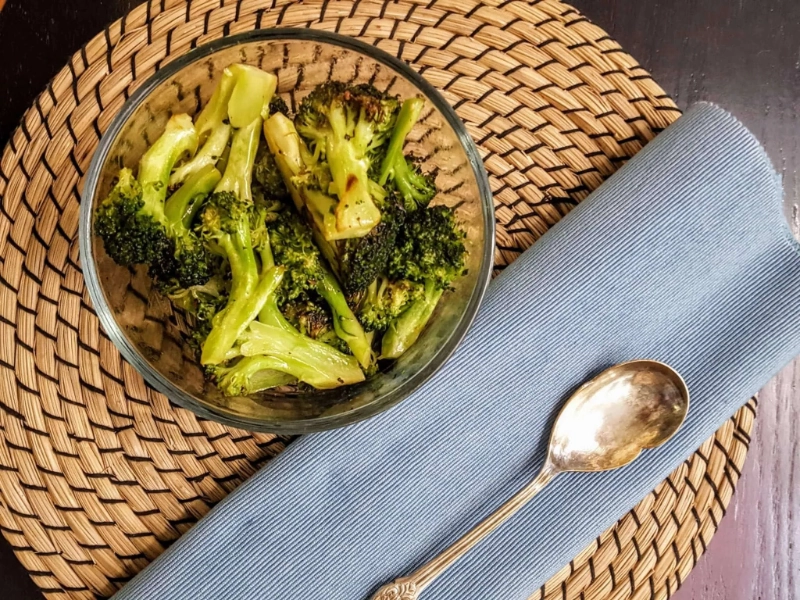Advertisement

Advertisement
1. Value of Collagen Maintaining the integrity and structure of our skin, bones, muscles, and connective tissues depends critically on the essential protein collagen. Collagen, the most plentiful protein in the body, gives flexibility and strength that helps to maintain our skin firm and young. But when one ages naturally, collagen production falls, which results in obvious ageing symptoms such sagging skin and wrinkles. Maintaining general health and a young look depends on supporting collagen formation via diet and lifestyle choices.
2. Broccoli's dietary profile A nutrient-dense vegetable, broccoli provides a great range of minerals and vitamins needed for general wellbeing. It is very high in vitamin C, a major component of collagen formation. Broccoli also has antioxidants, fibre, and numerous B vitamins—including folate. Broccoli is a great alternative for people trying to boost the collagen production in their body since these nutrients cooperate to support health and well-being.

3. Synthetic Collagen and Vitamin C One of the strongest antioxidants, vitamin C is also very important for collagen synthesis. Two amino acids—proline and lysine—that are vital for the generation of collagen must be hydroxylated. The body cannot efficiently create collagen without enough vitamin C, which can result in skin and connective tissues weakening. Just one serving of broccoli can provide a significant dose of vitamin C. Including broccoli in your diet will help you make sure you satisfy your daily vitamin C requirements, so aiding collagen formation.
4. Broccoli's antioxidant qualities Apart from vitamin C, broccoli boasts a great concentration of other antioxidants like sulforaphane and flavonoids. These substances guard the body from oxidative stress, which can compromise other proteins including collagen. Antioxidants are absolutely essential in maintaining collagen integrity and stopping early ageing by neutralising free radicals. Including broccoli in your diet will give your body a strong supply of antioxidants, so helping its capacity to generate and preserve appropriate levels of collagen.
5. Aminoacids and broccoli Amino acids—the building blocks of proteins—make up collagen. Although the body can synthesis some amino acids, others have to be taken from diet. Glycine and proline are two of numerous vital amino acids found in broccoli that help to produce collagen. Collagen fibres are formed from these amino acids, hence the body has the components it needs to produce and preserve this vital protein. Broccoli gives your body the tools it needs for best collagen synthesis.

6. Promoting Skin Condition Apart from its function in the synthesis of collagen, broccoli provides other advantages for the condition of skin. Broccoli's nutrients and vitamins aid to feed the skin, so enhancing a brilliant complexion. Particularly vitamin C helps skin repair and renewal; antioxidants shield against environmental harm. Broccoli is a great addition to any diet aimed on skin care and anti-aging since regular intake of it can result in better, more robust skin.
7. broccoli in a diet in balance Including broccoli in a balanced diet will help to maximise its advantages for the generation of collagen. Combining broccoli with other meals that boost collagen can help it be more beneficial. Foods high in omega-3 fatty acids, such fatty fish, and those heavy in zinc, such nuts and seeds, can accentuate the advantages of broccoli. Including a range of vibrant fruits and vegetables also guarantees a varied consumption of minerals and vitamins that boost general health and collagen synthesis.
8. Cooking Techniques Aimed towards Nutrient Preservation The nutritional value of broccoli will depend on how you cook it. Often advised to retain broccoli's vitamin C and antioxidant levels is steaming or gently sautéing it. Nutrient loss resulting from overcooking reduces the possible advantages. Raw broccoli should be included into salads or smoothies or choose short cooking techniques that preserve its vivid colour and nutrients if you want to maximise the health advantages.

9. Collagen and Broccoli Supplements There are supplements available for folks who might find it difficult to eat enough broccoli or other foods boosting collagen. Although they can supply the amino acids required for collagen synthesis, full dietary sources should not be replaced by collagen supplements. Rather, think about complementing a nutrient-dense diet including broccoli and other veggies with supplements. This mix can make sure your body has all it requires to generate collagen successfully.
10. Synopsis of Broccoli's Function in Production of Collagen A nutritional powerhouse that helps the body create collagen, broccoli supports Its great vitamin C content, antioxidants, and amino acids make it a necessary diet for preserving connective tissues and healthy skin. Including broccoli in a balanced diet can help people improve their collagen synthesis and take advantage of its many health advantages. Broccoli is a great addition to any diet since regular intake of it not only boosts collagen generation but also helps general health and well-being.

 3. Synthetic Collagen and Vitamin C One of the strongest antioxidants, vitamin C is also very important for collagen synthesis. Two amino acids—proline and lysine—that are vital for the generation of collagen must be hydroxylated. The body cannot efficiently create collagen without enough vitamin C, which can result in skin and connective tissues weakening. Just one serving of broccoli can provide a significant dose of vitamin C. Including broccoli in your diet will help you make sure you satisfy your daily vitamin C requirements, so aiding collagen formation.
4. Broccoli's antioxidant qualities Apart from vitamin C, broccoli boasts a great concentration of other antioxidants like sulforaphane and flavonoids. These substances guard the body from oxidative stress, which can compromise other proteins including collagen. Antioxidants are absolutely essential in maintaining collagen integrity and stopping early ageing by neutralising free radicals. Including broccoli in your diet will give your body a strong supply of antioxidants, so helping its capacity to generate and preserve appropriate levels of collagen.
5. Aminoacids and broccoli Amino acids—the building blocks of proteins—make up collagen. Although the body can synthesis some amino acids, others have to be taken from diet. Glycine and proline are two of numerous vital amino acids found in broccoli that help to produce collagen. Collagen fibres are formed from these amino acids, hence the body has the components it needs to produce and preserve this vital protein. Broccoli gives your body the tools it needs for best collagen synthesis.
3. Synthetic Collagen and Vitamin C One of the strongest antioxidants, vitamin C is also very important for collagen synthesis. Two amino acids—proline and lysine—that are vital for the generation of collagen must be hydroxylated. The body cannot efficiently create collagen without enough vitamin C, which can result in skin and connective tissues weakening. Just one serving of broccoli can provide a significant dose of vitamin C. Including broccoli in your diet will help you make sure you satisfy your daily vitamin C requirements, so aiding collagen formation.
4. Broccoli's antioxidant qualities Apart from vitamin C, broccoli boasts a great concentration of other antioxidants like sulforaphane and flavonoids. These substances guard the body from oxidative stress, which can compromise other proteins including collagen. Antioxidants are absolutely essential in maintaining collagen integrity and stopping early ageing by neutralising free radicals. Including broccoli in your diet will give your body a strong supply of antioxidants, so helping its capacity to generate and preserve appropriate levels of collagen.
5. Aminoacids and broccoli Amino acids—the building blocks of proteins—make up collagen. Although the body can synthesis some amino acids, others have to be taken from diet. Glycine and proline are two of numerous vital amino acids found in broccoli that help to produce collagen. Collagen fibres are formed from these amino acids, hence the body has the components it needs to produce and preserve this vital protein. Broccoli gives your body the tools it needs for best collagen synthesis.
 6. Promoting Skin Condition Apart from its function in the synthesis of collagen, broccoli provides other advantages for the condition of skin. Broccoli's nutrients and vitamins aid to feed the skin, so enhancing a brilliant complexion. Particularly vitamin C helps skin repair and renewal; antioxidants shield against environmental harm. Broccoli is a great addition to any diet aimed on skin care and anti-aging since regular intake of it can result in better, more robust skin.
7. broccoli in a diet in balance Including broccoli in a balanced diet will help to maximise its advantages for the generation of collagen. Combining broccoli with other meals that boost collagen can help it be more beneficial. Foods high in omega-3 fatty acids, such fatty fish, and those heavy in zinc, such nuts and seeds, can accentuate the advantages of broccoli. Including a range of vibrant fruits and vegetables also guarantees a varied consumption of minerals and vitamins that boost general health and collagen synthesis.
8. Cooking Techniques Aimed towards Nutrient Preservation The nutritional value of broccoli will depend on how you cook it. Often advised to retain broccoli's vitamin C and antioxidant levels is steaming or gently sautéing it. Nutrient loss resulting from overcooking reduces the possible advantages. Raw broccoli should be included into salads or smoothies or choose short cooking techniques that preserve its vivid colour and nutrients if you want to maximise the health advantages.
6. Promoting Skin Condition Apart from its function in the synthesis of collagen, broccoli provides other advantages for the condition of skin. Broccoli's nutrients and vitamins aid to feed the skin, so enhancing a brilliant complexion. Particularly vitamin C helps skin repair and renewal; antioxidants shield against environmental harm. Broccoli is a great addition to any diet aimed on skin care and anti-aging since regular intake of it can result in better, more robust skin.
7. broccoli in a diet in balance Including broccoli in a balanced diet will help to maximise its advantages for the generation of collagen. Combining broccoli with other meals that boost collagen can help it be more beneficial. Foods high in omega-3 fatty acids, such fatty fish, and those heavy in zinc, such nuts and seeds, can accentuate the advantages of broccoli. Including a range of vibrant fruits and vegetables also guarantees a varied consumption of minerals and vitamins that boost general health and collagen synthesis.
8. Cooking Techniques Aimed towards Nutrient Preservation The nutritional value of broccoli will depend on how you cook it. Often advised to retain broccoli's vitamin C and antioxidant levels is steaming or gently sautéing it. Nutrient loss resulting from overcooking reduces the possible advantages. Raw broccoli should be included into salads or smoothies or choose short cooking techniques that preserve its vivid colour and nutrients if you want to maximise the health advantages.
 9. Collagen and Broccoli Supplements There are supplements available for folks who might find it difficult to eat enough broccoli or other foods boosting collagen. Although they can supply the amino acids required for collagen synthesis, full dietary sources should not be replaced by collagen supplements. Rather, think about complementing a nutrient-dense diet including broccoli and other veggies with supplements. This mix can make sure your body has all it requires to generate collagen successfully.
10. Synopsis of Broccoli's Function in Production of Collagen A nutritional powerhouse that helps the body create collagen, broccoli supports Its great vitamin C content, antioxidants, and amino acids make it a necessary diet for preserving connective tissues and healthy skin. Including broccoli in a balanced diet can help people improve their collagen synthesis and take advantage of its many health advantages. Broccoli is a great addition to any diet since regular intake of it not only boosts collagen generation but also helps general health and well-being.
9. Collagen and Broccoli Supplements There are supplements available for folks who might find it difficult to eat enough broccoli or other foods boosting collagen. Although they can supply the amino acids required for collagen synthesis, full dietary sources should not be replaced by collagen supplements. Rather, think about complementing a nutrient-dense diet including broccoli and other veggies with supplements. This mix can make sure your body has all it requires to generate collagen successfully.
10. Synopsis of Broccoli's Function in Production of Collagen A nutritional powerhouse that helps the body create collagen, broccoli supports Its great vitamin C content, antioxidants, and amino acids make it a necessary diet for preserving connective tissues and healthy skin. Including broccoli in a balanced diet can help people improve their collagen synthesis and take advantage of its many health advantages. Broccoli is a great addition to any diet since regular intake of it not only boosts collagen generation but also helps general health and well-being.